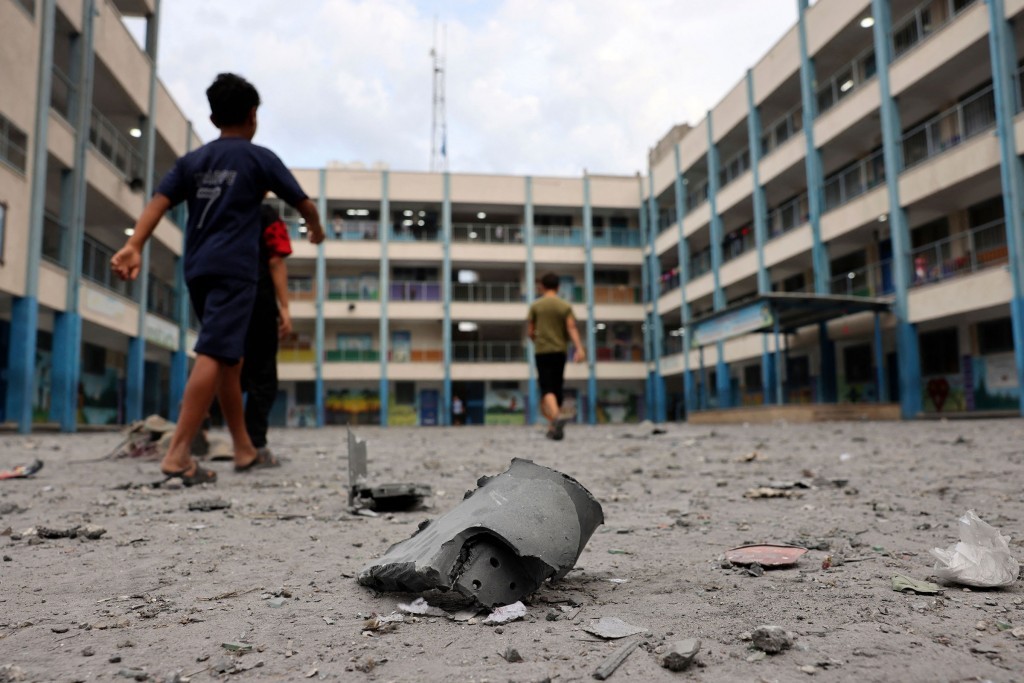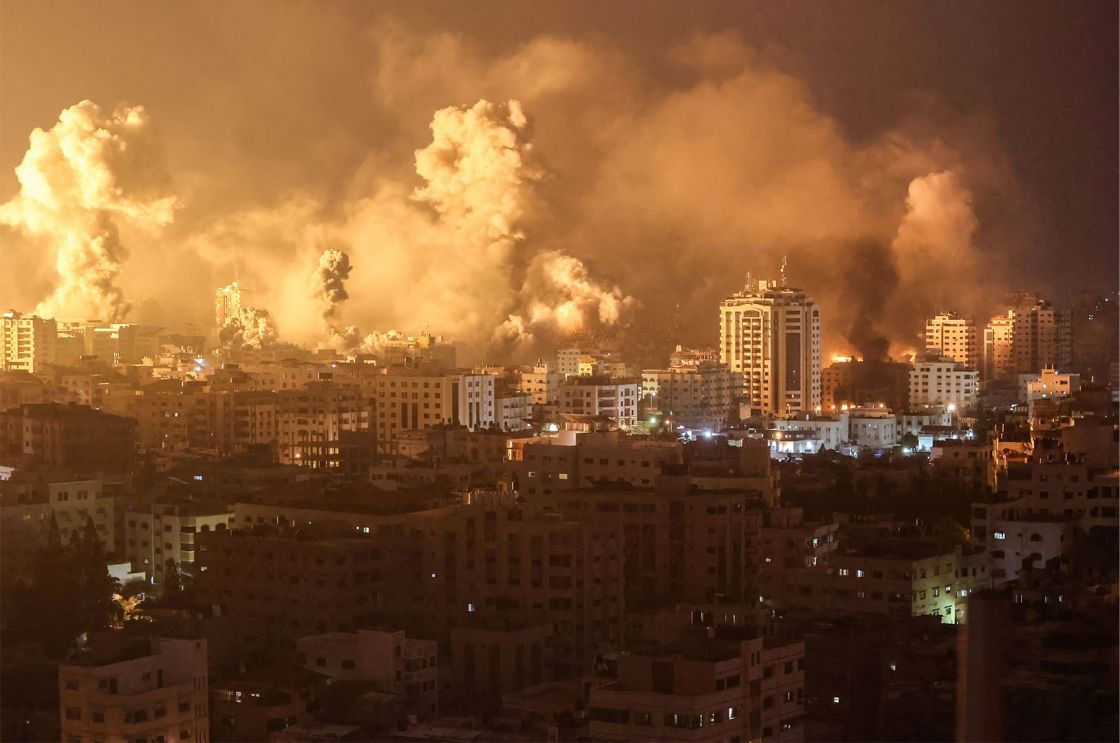- Articles
- Posted
The Occupying State, “Self-Defense”, and International Law
The Russian representative to the UN said in one of the many sessions held by the Security Council during the last few weeks to discuss the “Israeli” aggression against Gaza, and in response to the repeated Western argument for its unconditional support for the brutality of the Zionist entity based on “Israel’s” right of self-defense, the Russian UN representative said: “Israel has no right to defend itself because it is an occupying state.”
This statement discloses an important international law basis that the West deliberately ignores and neglects in the context of dealing with the Palestinian issue. Below is a brief overview of the legal background for this basis and conclusions based thereupon.
Gaza is under “Israeli” occupation
International law defines “occupation” as the exercise by a state of unacceptable control over territory over which it has no sovereign right. Occupation is defined in the Regulations Concerning the Laws and Customs of War on Land, known as the “Hague Regulations of 1907”, where Article 42 defines occupation as follows: “Territory is considered occupied when it is actually placed under the authority of the hostile army. The occupation extends only to the territory where such authority has been established and can be exercised”.
International law also regulates the boundaries and limitations on the practices of occupying authorities, which are legally framed by a set of provisions in the Hague Regulations of 1907, the Geneva Conventions of 1949, and the First Additional Protocol of 1977.
Furthermore, Common Article 2 of the Geneva Conventions of 1949 stipulates that these Conventions apply to any territory occupied during international hostilities, and apply even in cases where the occupation of a state’s territory is not met with any armed resistance. Specifically, Common Article 2 states: “The Convention shall also apply to all cases of partial or total occupation of the territory of a High Contracting Party, even if the said occupation meets with no armed resistance”. In other words, when realities on the ground rise to the level of occupation, the law of occupation must be applied, whether the occupation is “legitimate or not”, even if the occupation – for example – is approved or recognized by the Security Council.
According to international law, Gaza is considered under “Israeli” occupation, which was confirmed by several international bodies, including the UN. For example, the “Report of the Independent International Commission of Inquiry on the Occupied Palestinian Territory, including East Jerusalem, and Israel” No. A/HRC/50/21, dated of May 9, 2022, states in paragraph 16: “The Occupied Palestinian Territory, including East Jerusalem and Gaza, and the occupied Syrian Golan are currently under belligerent occupation by Israel, to which international humanitarian law applies. Despite the claim by Israel that it disengaged from Gaza in 2005, the Commission notes the positions of the Security Council and the General Assembly, the declaration of 17 December 2014 adopted by the Conference of High Contracting Parties to the Geneva Convention relative to the Protection of Civilian Persons in Time of War (Fourth Geneva Convention), the assessment by the International Committee of the Red Cross (ICRC) and the positions of previous commissions of inquiry, along with the lack of authoritative findings to the contrary, that Israel remains in occupation of the territory by virtue of the control exercised over, inter alia, its airspace and territorial waters, land crossings at the borders, supply of civilian infrastructure, including water and electricity, and key governmental functions such as the management of the Palestinian population registry”. The report adds in paragraph 22: “the State of Palestine comprises the West Bank …, all of East Jerusalem, and the Gaza Strip. [The Commission] further considers that Israel remains in belligerent occupation of all these territories and is therefore the primary duty bearer within these territories, along with the occupied Syrian Golan”.
The abovementioned report referred to UNSC Resolution 242 (1967), which “called for the withdrawal of Israeli armed forces from ‘territories occupied in the recent conflict’…. Despite this, Israel has not brought an end to the occupation, which would allow the Palestinian people to enjoy their right to self-determination. The Special Rapporteur on the situation of human rights in the Palestinian territories occupied since 1967 has called the situation an occupation in perpetuity, emphasizing … the clear requirement under international law that the Israeli occupation must be temporary”.
Additionally, the Commission report No. A/77/328, dated September 14, 2022, stated in paragraph 75: “The Commission finds that there are reasonable grounds to conclude that the Israeli occupation of Palestinian territory is now unlawful under international law owing to its permanence and to actions undertaken by Israel to annex parts of the land de facto and de jure”.

Who has the right of self-defense in international law?
UN Charter, Chapter VII, Article 51 talks about right of self-defense, and states: “Nothing in the present Charter shall impair the inherent right of individual or collective self-defense if an armed attack occurs against a Member of the United Nations, until the Security Council has taken measures necessary to maintain international peace and security. Measures taken by Members in the exercise of this right of self-defense shall be immediately reported to the Security Council and shall not in any way affect the authority and responsibility of the Security Council under the present Charter to take at any time such action as it deems necessary in order to maintain or restore international peace and security”.
According to this text, the “right of self-defense” is activated in the event that there is an armed attack on a member of the US, that is, in other words, when there is an armed aggression, which the International Law Commission defined in 1951 as any use of force or threat thereof by a state or a government against another state ... except in cases of individual or collective legitimate defense.
The UN General Assembly also defined aggression in its Resolution A/RES/3314(XXIX) adopted on December 14, 1974, where Article 1 of the resolution stated: “Aggression is the use of armed force by a State against the sovereignty, territorial integrity or political independence of another State”. Article 3 of the resolution adds: “Any of the following acts, regardless of a declaration of war, shall… quality as an act of aggression: (a) The invasion or attack by the armed forces of a State of the territory of another State, or any military occupation, however temporary, resulting from such invasion or attack, or an annexation by the use of force of the territory of another State or part thereof”.
The resolution also adds in Article 7: “Nothing in this Definition, and in particular article 3, could in any way prejudice the right to self-determination, freedom and independence, as derived from the Charter, of peoples forcibly deprived of that right and referred to in the Declaration on Principles of International Law concerning Friendly Relations and Co-operation among States in accordance with the Charter of the United Nations, particularly peoples under colonial and racist regimes or other forms of alien domination; nor the right of these people to struggle to that end and to seek and receive support”.
Conclusions
According to all the above, the following can be concluded:
First: The attack carried out by Hamas on October 7, 2023, is not an aggression in the international sense that requires the application of international principles and laws with regard to wars between two states, because it was carried out by a group and not a state or government of a state. Additionally, some countries’ classification of Hamas or its military wing as “terrorist” can be considered implicit acknowledgment that it does not, in the legal sense, represent the Palestinian state or its government.
Second: “Israel” as an occupying state and due to its belligerent, illegal occupation in perpetuity of the Palestinian territory, including Gaza, meets the definition of aggression, which makes it the aggressor and in a permanent state of aggression against the Palestinian state and the Palestinian people.
Third: According to all of the above, not only does “Israel” not have the right to self-defense due to the lack of the necessary conditions to trigger this right as stated in the United Nations Charter, but it is the Palestinian people – individually and collectively – who have the right to continuous self-defense as long as “Israel” exists and is defined as an occupying state, as is the case.
Here it can also be noted that the Special Rapporteur on the situation of human rights in the occupied Palestinian territories, Francesca Albanese, stated and explained in a series of tweets on her account on the X platform (formerly Twitter) that “under international law, Israel’s actions in Gaza cannot qualify as self-defense”.



